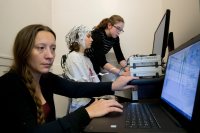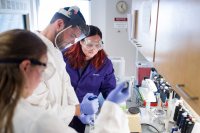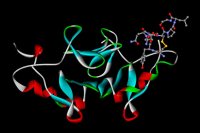
Emotions Symposium starts with 'happy' for Bates students
When a research institute at the University of Wisconsin-Madison awarded travel grants for an emotions-research symposium, most of the 86 recipients were graduate students and postdocs. But two were Bates students.
Neuroscience major Whitney Sheen ’05 of Flagstaff, Ariz., and psychology major Keith Hengen ’06 of Concord, N.H., were among just seven undergrads to receive grants defraying travel costs for the 11th annual Wisconsin Symposium on Emotion, held in April by the HealthEmotions Research Institute at UW-Madison.
The grant process is quite competitive, said Will Shattuck, administrator at the institute. “By the time young scientists-in-training hit the graduate and postdoctoral levels, they’ve got a pretty good idea of where they want to apply their talents. But for many undergraduates, this is still pretty advanced stuff,” he said.
“It shows some real initiative as an undergraduate to apply for an award to attend this symposium.”
The event was titled “Genes, Brain, & Emotion: Genetic and Molecular Bases of Normal and Abnormal Emotional Processes.” For Sheen, one of the best things about it was the presenters’ emphasis on the big picture. “The subject’s relevance is so global, and that’s really appealing to me,” Sheen said. “It’s not an esoteric thing, even though most people think that neuroscience is. It applies to everybody in every situation.”
The two-day gathering also marked something of a turning point for her.
“Before the symposium, I wasn’t exactly sure where I wanted to go in neuroscience,” said Sheen, who graduated in May. But a presentation on the human stress response by Salk Institute neurobiologist Wylie Vale, an authority on brain hormones, changed that.
“I came back from the symposium excited and enthused about stress research,” Sheen said. “This was the first time I’d really considered doing that.”
A presentation by Dr. Kenneth Kendler, director of the Virginia Institute for Psychiatric and Behavioral Genetics, also got Sheen’s attention. Kendler, she says, laid out how social impacts can affect genetic expression.
“That was really eye-opening for me,” Sheen said. “It was something I had always thought, but it had never been presented that clearly to me — the fact that social impacts can influence gene expression, which influences neuronal networks, and then brain systems, and then behavior. It’s like a circle.”
Sheen and Hengen learned about the symposium and the travel grants from Roxanne Prichard, visiting assistant professor of psychology at Bates, when they took her “Cognitive Neuroscience” course during the winter.
Of 152 applications for this year’s travel grants the HealthResearch Institute received, only 15 came from undergrads, said Shattuck.




